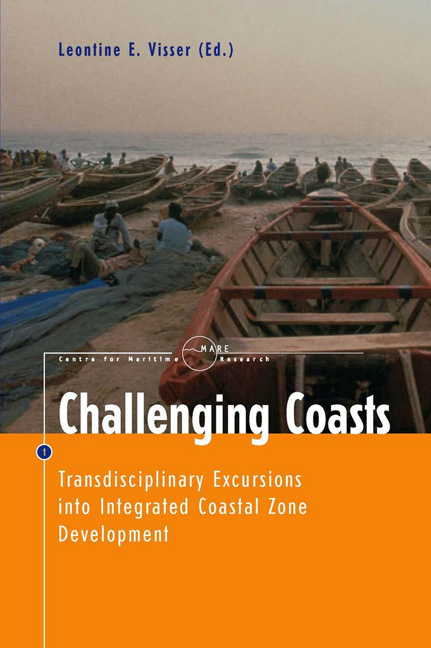Book contents
- Frontmatter
- Series Foreword
- Contents
- Acknowledgments
- 1 Introduction
- 2 Reflections on Transdisciplinarity, Integrated Coastal Development, and Governance
- 3 Biodiversity and the Natural Resource Management of Coral Reefs in Southeast Asia
- 4 A Concerted Approach towards Managing Living Resources in a Marine Protected Area
- 5 ‘Making Do’: Integrating Ecological and Societal Considerations for Marine Conservation in a Situation of Indigenous Resource Tenure
- 6 Basic Principles Underlying Research Projects on the Links between the Ecology and the Uses of Coral Reef Fishes in the Pacific
- 7 The Marine Implementation of the EC Birds and Habitats Directives: the Cases of Shipping and Oil Exploration Compared
- 8 Stakeholder Conflicts and Solutions across Political Scales: the Ibiraquera Lagoon, Brazil
- 9 ‘The Rich Eat Fish and the Poor Eat Pork’: The Decline of the Livelihoods of Handpickers of Aquatic Organisms in North Vietnam
- Index
- List of Contributors
2 - Reflections on Transdisciplinarity, Integrated Coastal Development, and Governance
Published online by Cambridge University Press: 28 January 2021
- Frontmatter
- Series Foreword
- Contents
- Acknowledgments
- 1 Introduction
- 2 Reflections on Transdisciplinarity, Integrated Coastal Development, and Governance
- 3 Biodiversity and the Natural Resource Management of Coral Reefs in Southeast Asia
- 4 A Concerted Approach towards Managing Living Resources in a Marine Protected Area
- 5 ‘Making Do’: Integrating Ecological and Societal Considerations for Marine Conservation in a Situation of Indigenous Resource Tenure
- 6 Basic Principles Underlying Research Projects on the Links between the Ecology and the Uses of Coral Reef Fishes in the Pacific
- 7 The Marine Implementation of the EC Birds and Habitats Directives: the Cases of Shipping and Oil Exploration Compared
- 8 Stakeholder Conflicts and Solutions across Political Scales: the Ibiraquera Lagoon, Brazil
- 9 ‘The Rich Eat Fish and the Poor Eat Pork’: The Decline of the Livelihoods of Handpickers of Aquatic Organisms in North Vietnam
- Index
- List of Contributors
Summary
Introduction
The past forty years have been a time of momentous change globally. An important part of that change has been an increasing awareness of and mounting concern for the erosion of the natural environment including, in particular, the world's coasts. This paper addresses the conceptual and methodological challenges that are increasingly apparent with regard to the dominant strategy that responds to degradation of the world's coasts: integrated coastal zone management (ICZM). One of the most important realisations within ICZM in recent years is that natural sciences alone cannot meet the current challenges posed by coasts. It is becoming increasingly apparent, as the papers in this volume show, that the analytical strength of the natural sciences in the study of ecosystem change has to be coupled with the social science study of social transformation. This paper argues for the value of a transdisciplinary approach to ICZM that learns from the critiques of the history of science that have been done within the social sciences and humanities. A transdisciplinary perspective highlights the current shortcomings of method and concepts in ICZM and points to ways in which those shortcomings may be addressed.
By the mid-1960s, the notion of continuous progress in both the social and the natural sciences was in jeopardy. The French historian and philosopher Michel Foucault became highly influential by critically reflecting upon the ‘history of ideas’, and his own ideas were embraced by a variety of people: scholars as well as individuals in the public and private sectors. This has helped pave the way for more interest in the human and the social sciences, and a scholarly interest in local or indigenous knowledges and social forms of environmental management. Three insights from these new interests are as follows. First, scholarly disciplines or ‘bodies of knowledge’ have a historical sequence but they are otherwise discontinuous instead of showing an evolutionary development (McHoul and Grace 1993:31). Secondly, disciplines are not regarded as conveying ‘the’ truth. But this does not mean that there is no truth. On the contrary, there can sometimes be many truths, each with its own rationality. But the question is: whose truth? Which of these, at a given period, became dominant and how? Thirdly, the power of certain disciplines produces other, subjugated or marginal knowledges that are dismissed by official histories as ‘less scientific’ and located at the bottom end of the hierarchy (ibid.:15).
- Type
- Chapter
- Information
- Challenging CoastsTransdisciplinary Excursions into Integrated Coastal Zone Development, pp. 23 - 48Publisher: Amsterdam University PressPrint publication year: 2004



